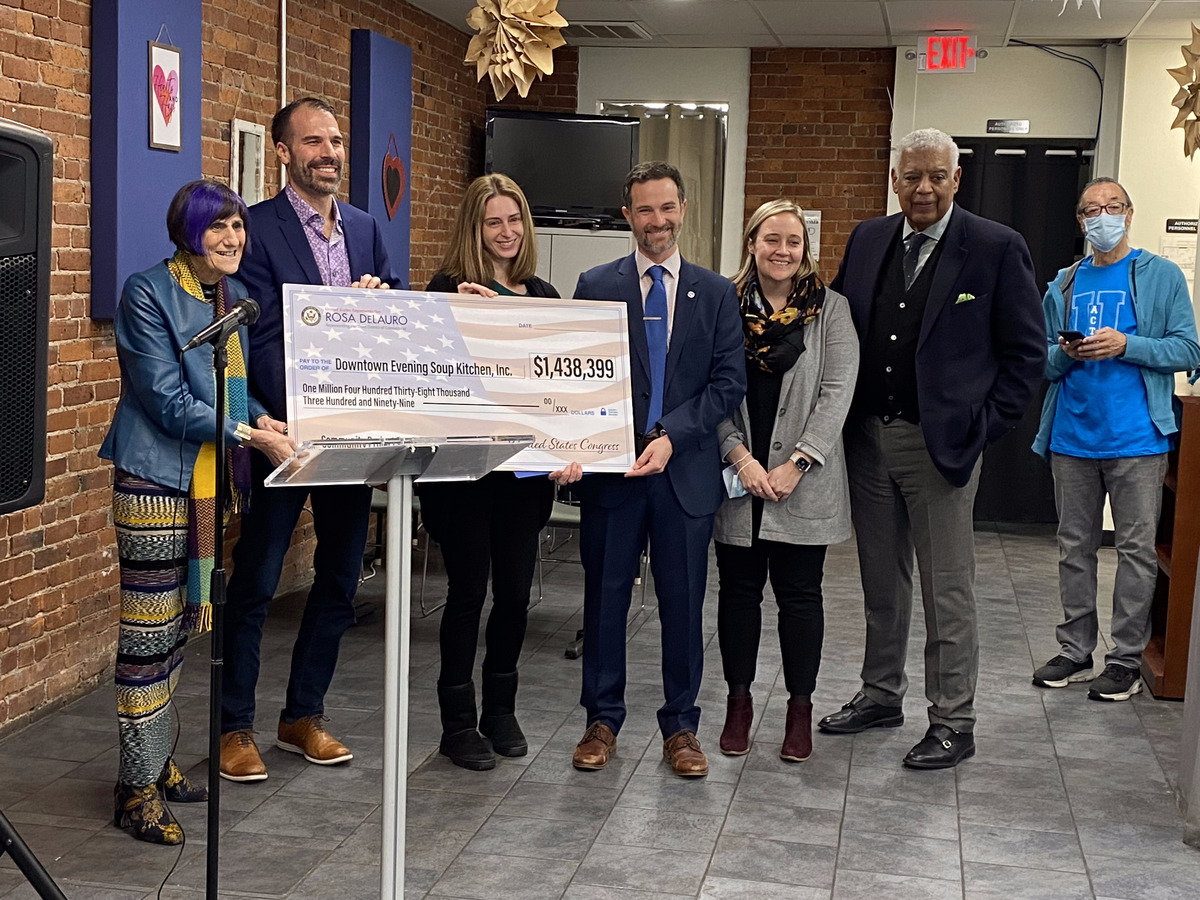Downtown Evening Soup Kitchen receives $1.4 million in federal funding
DESK will use the money to renovate its drop-in center and expand services.

Sadie Bograd, Contributing Photographer
New Haven’s downtown drop-in resource center for homeless residents will undergo major renovations, thanks to $1.4 million in new federal community project funding orchestrated by Rep. Rosa DeLauro.
The Downtown Evening Soup Kitchen, or DESK, announced the funding during a press conference at its State Street center on Wednesday morning. DESK and its partners will use the money to redesign all four floors of the building and expand their medical and case management services.
“We’re going to continue to do what we’ve always done: provide basic needs,” said DESK executive director Steve Werlin. “We’re [also] going to have next-level and specialized services offered on site … We will encourage and welcome and affirm all individuals, regardless of whatever hardships they’re bringing into the space when they come.”
The renovations, entrusted to local architecture firm Svigals + Partners, will include converting the unfinished basement into a commercial kitchen and adding showers and a meeting room to the second-floor resource center. Three-quarters of the second floor will be rented to Cornell Scott-Hill Health Center, which will provide on-site medical care. The building’s infrastructure will also get an upgrade, with a new elevator, stairs and HVAC system.
“I’m going to fully express how I feel about this project, and that is to say, ‘Yay, yay, yay, yay,’” said Michael Taylor, CEO of Cornell Scott-Hill. “Our homeless health care team cares for people in shelters, under bridges, beside railroad tracks. What a wonderful thing to give those who are suffering from homelessness a medical home that speaks to the respect and high regard that we have for them.”
The first floor will continue serving as a drop-in center but will be refurbished with a “trauma-informed lens,” according to Werlin. He explained that DESK aims to “brighten” and “soften” the space, altering the acoustics of the room in order to reduce noise levels.
Currently, the drop-in center also serves as an overnight warming center to compensate for the shortage of shelter beds during the colder months. DESK aims to start construction at the end of this winter when the warming center is no longer necessary and finish renovations by the end of the year.
The organization opened the drop-in center in April 2021 after a series of community conversations with clients, volunteers and other stakeholders. The center helps clients with a range of needs, from meals to toiletries to first aid and overdose prevention services.
Although the center had been in the works for years, Werlin said that the COVID-19 pandemic accelerated DESK’s timeline.
“We were rushing really, really, really quickly in those early months, because there was an acute need,” Werlin said. “But from the moment that we found this building, we knew right from the beginning that we were going to have to do major renovations.”
Werlin noted that the drop-in center is intended to be accessible and low-barrier. It is street-level and located close to the New Haven Green, where many of New Haven’s homeless residents live.
“No longer are we going to be in church basements, in dark alleys hiding,” Werlin said. “We are really going to be upfront and visible so that people can find us.”
He added that the center is also meant to be “emotionally accessible” — not an “intimidating” space but rather one that is “imbued with dignity from the top to the bottom.”
Kelly Fitzgerald, director of the Greater New Haven Coordinated Access Network, said the updated drop-in center will be valuable in helping connect people experiencing homelessness to resources. She noted, however, that the system is limited in its ability to move people from homelessness to housing.
“We need enough shelter beds and enough housing so that every person that’s walking through this door has a space to go to next,” Fitzgerald said.
DESK was one of 15 organizations in Connecticut’s Third District, along with the Fair Haven Community Health Clinic and Wilbur Cross High School, to receive federal community project funding.
DeLauro, who previously chaired the House Appropriations Committee, worked to reestablish community project funds in the 2022 spending bill after more than a decade without them. The funds enable representatives to direct federal money to local projects that otherwise might not receive support. DeLauro emphasized that the funds were awarded via a transparent process reviewed by the Government Accountability Office.
Wednesday’s press conference was also attended by other local homeless services providers and members of New Haven’s Unhoused Activists Community Team.







